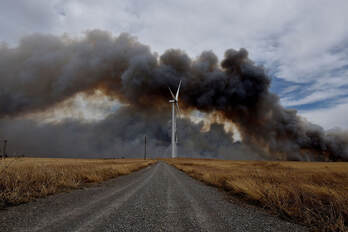 The Rhea Fire in Seiling, OK 4/17/2018 The Rhea Fire in Seiling, OK 4/17/2018 I find it interesting to learn about how people in other countries deal with natural disasters and other such things in comparison to us. Do they have the technology, equipment, and knowledge that we have? Are we really better equipped than other countries to handle disasters like we think we are? How does the community come together to help in times of need? Ways to fight fires have dramatically improved with time, though the stress of having to experience the fire is no less. My husband's paternal family is originally from Crimea, Russia, the Bessarabia area in particular. The following story is about how a village fire was handled in the early 1940's in Bessarabia. Story: It’s Burning! Source: DAI Microfilm T-81; Roll #599; Serial 817; Group 1035; Item 1275; Frames 5386761-5386762 Translated by Allen E. Konrad – January 2013 PO Box 157 Rowley, IA 52329 [Translator’s Note: This document lists no author, nor indicates when written. Found in a folder of documents about customs and practices of Bessarabia, probably written shortly after the Resettlement of 1940. An insight as to how fires in a village are handled.] [Begin Translation] It’s Burning! There was a vine wood pile between our house and the neighbor’s house. As a 13 year old boy, I was often in this nook with my comrades and we would smoke dried corn husks or horse manure. No sooner did one of the “bad boys” show up with tobacco from his father’s tin, and we were now going to smoke real tobacco, my mother caught us and that evening I got a sound thrashing from my father. It was only later on that I came to understand the seriousness of it all when I recognized the great danger of fire in the dry, hot steppe of Southern Russia. When the long, dry summer months arrived, everything got so dry that the slightest spark could cause the greatest misfortune. At that time some houses were still covered with reeds. However, the greatest danger was when the grain was hauled to the house and threshed on the large threshing floor with the grooved stone rollers or threshing machines. A few days before the time of threshing got started, the constable would go through the village and announce, “Every farmyard is obligated to set up a barrel with water from the well and smoking at the threshing floor and on the “Harbien” (these are tall rack wagons) is strictly prohibited.” A public water system and fire department did not exist in Bessarabia. In earlier years the alternative was a prototype of a fire engine with a water barrel that was brought to the gable end of the farmhouses. The farmer in need was obliged to get the fire wagon from the community hall and bring it to the place where the fire was. Should it so happen that this or that farmer is rewarded with a cause of fire either by a spark from the threshing machine landing on a straw stack, or that a smoker throws away his cigarette carelessly, or on a Sunday the boys play at being “smokers” behind the straw stack or wood pile, in short order the terrible report goes throughout the village: “It’s burning!” On every street someone is running and shouting at the top of his lungs until someone finally gets to the church and sounds the fire alarm bell. The ringing of the bell during the night is especially terrifying. A flag in the church steeple indicates the direction where the fire is and everyone is now running with pails and forks or pulling the water barrel to the site of the fire. Meanwhile, the “fire guard” (Brandschutz) also shows up and shouts his orders. In a short time, the wells of the neighboring farmyards are empty and water has to be hauled from ever farther distances. It might happen that the water supply is completely exhausted and the flames can then continue to rage undisturbed. It is very bad for those villages that have only one or two wells available to them. Oh my, how bad if the wind is also blowing hard! Then there is the possibility that whole houses, if not a whole row of village houses burn down. The inhabitants stand by powerless as the flames consume a house, a straw stack, one after the other. It is gratifying to see how everything is set aside and everyone gets involved: the old and the young, friend and foe, farmer, laborer, teacher and pastor—there is genuine unity, something one might wish for at all times. [End of Translation] Source: Black Sea German Research; Website: http://www.blackseagr.org/pdfs/konrad/Story%20-%20Its%20Burning.pdf?fbclid=IwAR11Ote2_nZrxdTihBcTMCDRSjwOem3mSFa0jod5Kgvm8GCaHFYghpUYYJk
2 Comments
|
AuthorMy name is Vicky, and after researching my family history since 1999, I have found amazing stories that need to be told. I hope you enjoy them as much as I have! Archives
May 2023
Categories |
 RSS Feed
RSS Feed